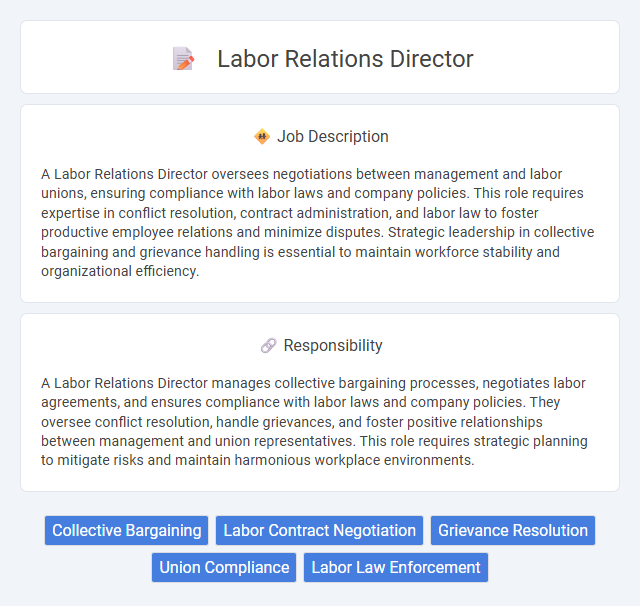
A Labor Relations Director oversees negotiations between management and labor unions, ensuring compliance with labor laws and company policies. This role requires expertise in conflict resolution, contract administration, and labor law to foster productive employee relations and minimize disputes. Strategic leadership in collective bargaining and grievance handling is essential to maintain workforce stability and organizational efficiency.
Individuals with strong interpersonal skills and a deep understanding of labor laws are likely to thrive as Labor Relations Directors, as the role demands effective communication and conflict resolution abilities. Those who are comfortable navigating complex negotiations and maintaining professional relationships between management and employees may find this position suitable. Candidates who struggle with high-pressure environments or lack empathy and patience might face challenges in meeting the job's requirements.
Qualification
A Labor Relations Director typically requires a bachelor's degree in human resources, labor relations, or business administration, with many roles preferring a master's degree for advanced expertise. Key qualifications include extensive knowledge of labor laws, collective bargaining, conflict resolution, and experience managing union relationships. Strong leadership, negotiation skills, and the ability to analyze complex labor contracts are essential for successfully navigating workforce disputes and fostering productive employer-employee partnerships.
Responsibility
A Labor Relations Director manages collective bargaining processes, negotiates labor agreements, and ensures compliance with labor laws and company policies. They oversee conflict resolution, handle grievances, and foster positive relationships between management and union representatives. This role requires strategic planning to mitigate risks and maintain harmonious workplace environments.
Benefit
A Labor Relations Director is likely to enjoy substantial benefits including competitive salary packages, comprehensive health insurance, and retirement plans. They probably receive professional development opportunities and bonuses tied to performance outcomes. Access to legal support and conflict resolution resources may also be part of the benefits, enhancing overall job satisfaction.
Challenge
The Labor Relations Director likely faces the challenge of balancing employer interests with employee rights amidst evolving labor laws and union negotiations. Managing conflict resolution and fostering cooperative dialogue may require strategic communication and problem-solving skills. Navigating these complexities could significantly impact organizational harmony and workforce productivity.
Career Advancement
A Labor Relations Director oversees employee-employer interactions, negotiates labor contracts, and resolves workplace disputes to ensure compliance with labor laws and company policies. Career advancement opportunities often lead to executive roles such as Vice President of Human Resources or Chief Human Resources Officer, requiring strong leadership, negotiation skills, and extensive industry experience. Mastery of labor laws, strategic influence, and successful conflict resolution significantly enhance prospects for progression in this field.
Key Terms
Collective Bargaining
Labor Relations Directors specialize in managing collective bargaining processes to establish fair and effective agreements between employers and employee unions. They analyze contract proposals, negotiate terms related to wages, benefits, and working conditions, and ensure compliance with labor laws and regulations. Their expertise helps maintain positive employer-employee relationships, reduce labor disputes, and promote organizational stability.
Labor Contract Negotiation
A Labor Relations Director specializes in labor contract negotiation, ensuring equitable terms between management and employee unions. This role involves analyzing labor laws, drafting collective bargaining agreements, and resolving disputes to maintain workplace harmony. Expertise in negotiation strategies and regulatory compliance is essential to secure agreements that support organizational goals and employee satisfaction.
Grievance Resolution
A Labor Relations Director specializing in grievance resolution oversees the effective handling and resolution of employee grievances to maintain a harmonious workplace. Expertise in negotiation, conflict management, and labor law ensures compliance and fosters constructive dialogue between management and labor unions. Implementing strategic grievance procedures reduces disputes, enhances employee satisfaction, and minimizes potential labor disruptions.
Union Compliance
A Labor Relations Director oversees union compliance by ensuring adherence to collective bargaining agreements, labor laws, and workplace policies. They conduct regular audits and negotiations to resolve disputes and mitigate risks related to union activities. Expertise in federal and state labor regulations enables them to maintain productive labor-management relationships and prevent costly grievances.
Labor Law Enforcement
A Labor Relations Director specializing in Labor Law Enforcement ensures compliance with federal and state labor regulations, including the Fair Labor Standards Act (FLSA) and the National Labor Relations Act (NLRA). This role involves overseeing collective bargaining agreements, managing disputes, and implementing policies to mitigate legal risks related to workplace rights and union interactions. Expertise in regulatory audits, employee grievance resolution, and labor negotiation strategies is critical for maintaining lawful and productive labor relations.
 kuljobs.com
kuljobs.com